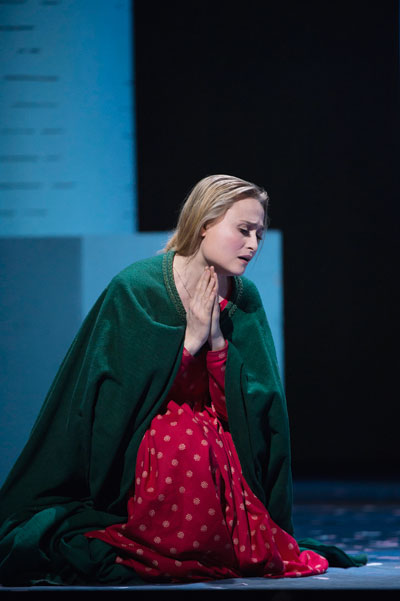In one of his finest essays, Gore Vidal recalls that when he worked as a scriptwriter for MGM the Wise Hack always used to advise his toffee-nosed team that ‘shit has its own integrity’. If crap is what you’re producing, make sure there are no signs in it that that’s what you think it is. Meyerbeer’s Robert le diable fails that test, I think, as do the rest of his operas. And at the Royal Opera, where a new production by Laurent Pelly, shared with Geneva, is on display, there are plenty of indications that no one involved takes it seriously either.
When the curtain rose on knights in medieval armour, I thought for a moment that Pelly might be trying the revolutionary gambit of setting an opera in the period specified by the libretto, but then I noticed Bertram over the other side of the stage in a frock-coat and stovepipe hat, and saw the knights acting in unison and exaggeratedly, and realised we were in for an extremely long evening of camp. Actually, on this occasion, Pelly’s touch is so unsure that there are long stretches where Robert is played straight, or straightish, though the scenery gives it away. The palace at Palermo, for example, looks like a moderately expensive toy, and Isabelle, the heroine, pops up from a turret in only one of the many moments in the evening that caused a giggle to run through the audience
Not that keeping a straight face would save this work, unproduced at Covent Garden since 1890 for the most obvious reason. Kasper Holten, in his introductory note in the programme, writes about ‘Meyerbeer’s combination of great spectacle and shamelessly entertaining moral fable’, but he can’t have meant a word of that. It’s no good saying, as the longest essay in the programme does, that ‘the theological dimension is very powerful’ and much more to the same effect. You might as well say that Agatha Christie’s novels are serious studies of death, betrayal and confession. Scribe, the senior librettist, was incapable of producing anything but tosh, and Meyerbeer was in some respects a brilliant craftsman but in no respect an artist. He would have been a superb writer of movie music, for shuddering strings, explosions of brass, suggestions of melody that never achieve the slightest memorability, are his stocks in trade.
The Royal Opera had much-advertised crises with its cast, one of the female leads, Marina Poplavskaya, coming, going and coming back, and the other ‘realising’ that she was unsuitable for the role of Isabelle, and being replaced at the last minute by Patrizia Ciofi, who has the least implausible music of the evening, which she handled well.
Poplavskaya, as Robert’s foster sister, gave a typically blank performance, though she sang adequately. Robert, a torn soul, son of a devil but with some good intentions, is Bryan Hymel, giving an account of this hardly coherent character with admirable conviction. But his diabolical ‘friend’ and father Bertram is portrayed still more vividly by John Relyea, a fine singer who only seems to appear every few years. Bertram and Robert are so clearly derived from Weber’s Der Freischütz, that great work which Covent Garden has neglected for decades, that one wonders why Meyerbeer was so reckless as to invite the comparison. The most famous scene, the ballet of dead nuns rising from their tombs and ensnaring Robert, involves gyrations, erotic groans, diaphanous nighties. I suppose, since Meyerbeer was once so fêted a figure, he has to be revived from time to time to make sure that he is unrevivable, and the Royal Opera has done that job very thoroughly.
This week’s Met HD relay was of Verdi’s Un Ballo in Maschera, for me Verdi’s greatest middle-period opera, though it presents problems of plausibility even by the standards that he seems to have been happy to abide by. David Alden sets it, as he likes to do, in no period in particular, with scenery that evokes the inner lives of the characters rather than their environment.
He has a standard international cast, with Marcelo Alvarez as the King, in love with the Amelia of Sondra Radvanovsky, wife of Gustavo’s closest friend Renato, the Met favourite Dmitri Hvorostovsky, who as always played himself, as the interview with him in the first intermission made comically plain. None of these singers has a distinctive voice or presence, though they are all competent. They might have made a stronger impression if Fabio Luisi, the conductor, had welded the heterogeneous elements in the opera more successfully together. Besides that, he took Amelia’s great Act II scene at an impossibly slow tempo, and the love duet that follows, Verdi’s most involving, also moved in fits and starts. Stephanie Blythe had the most imposing presence, in the role of the gypsy sorceress Ulrica. The tunes, as always, stayed in my head for days afterwards, but not the action or the characters.






Comments